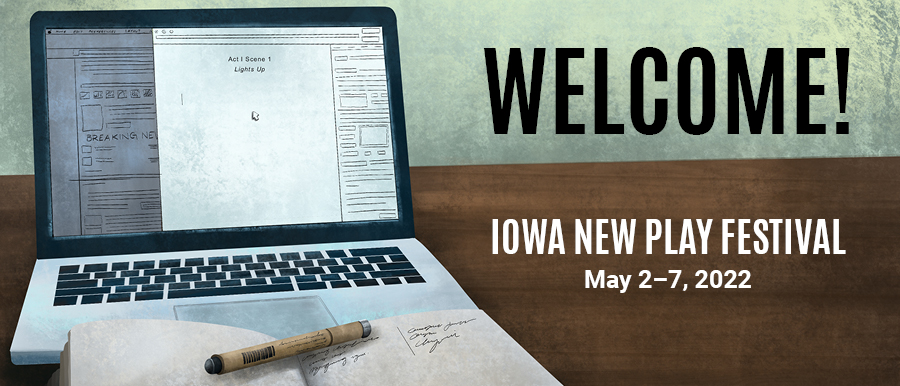
For the first time since 2019, the University of Iowa Department of Theatre Arts is presenting the Iowa New Play Festival. The pandemic caused cancellation of the festival in 2020, disrupting an annual tradition going back more than forty years. In 2021, the Theatre Arts community came together to present a festival on Zoom that was alive with the words, talents, and imaginations of its students and faculty. As good as it was, though, there was an essential element missing: you, the audience, with the immediacy of your response to the work on stage. So welcome - or welcome back! – to the Iowa New Play Festival.
All members of the graduate Iowa Playwrights Workshop, along with students from the Undergraduate Playwriting Workshop, are represented in the Festival. The graduate workshop was formally organized in the fall of 1971, although a strong tradition of playwriting has existed at the University since 1921, when the department was under the leadership of E.C. Mabie. Head of the department from 1920 until his death in 1956, Mabie was dedicated to the writing and production of original plays. The workshop was one of the first university programs to concentrate solely on playwriting and is one of the most production-oriented playwriting programs in the country.
Preparing ten new plays and presenting them in a single week is a monumental undertaking that is only possible through the utilization of UI Department of Theatre Arts’ wide-ranging resources in acting, directing, design, dramaturgy, stage management, and technical support. Through staged readings, workshops, and productions, festival showcases the process of new play development. While the play begins with the playwright’s vision, festival’s focus is on the script-in-process, and on the artistic contributions the playwright’s collaborators make to bringing the play to life on stage. Like the scripts, festival productions are in-process. The purpose of readings and performances is to reveal the essential vision of the play.
A special feature of our festival is its guest artists, who are invited to attend the festival in order to give dramaturgical feedback to both playwrights and their collaborators, and to provide advice on the future artistic and professional life of the play. We are pleased to have this year’s guests – Noel Allain, John Baker, Katie Gamelli, Vicki Grise, and Sydné Mahone – present in person. Many of the plays premiered during festival have gone on to productions at professional theatres throughout this country and abroad. Our guest artists often play a role in making that happen. We thank them for their support and we thank you, our audiences, for your contribution to the process of creating new theatre.